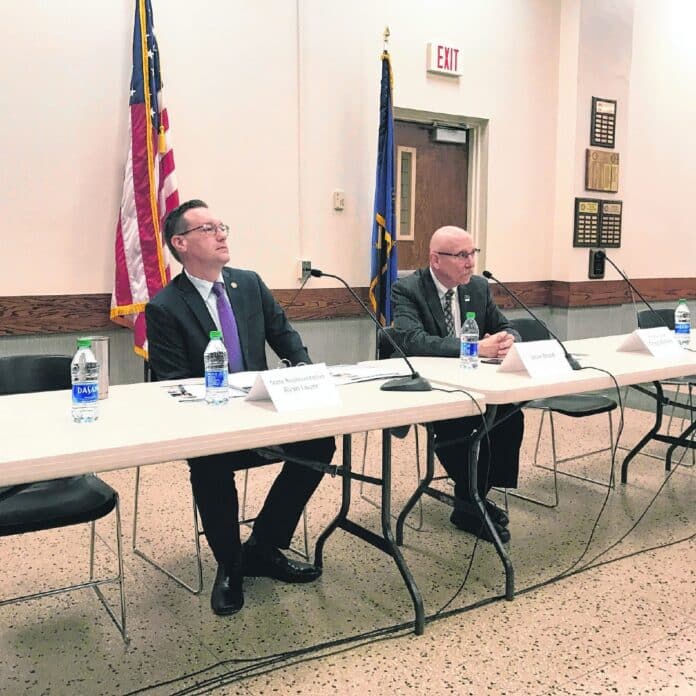
COLUMBUS, Ind. — Two local legislators visited with constituents online for a virtual Third House Monday, to talk about pending legislation being considered this session.
About 100 area residents tuned in for the session which covered a variety of topics, including one that Sen. Greg Walker, R-Columbus termed as one of the “burning bills of the year” — business owners dealing with liability issues over COVID-19.
Walker and Rep. Ryan Lauer, R-Columbus, say they do not believe a complete blanket immunity for employers should be provided. Immunity should not be given if an employer displays gross negligence, or demands that a worker known to have the virus return to work.
“But the problem is, how do you necessarily associate where you came in contact with the virus?” Walker asked. “(SB 001) is trying to avoid those class action lawsuits. We need to acknowledge we all live at a higher rate of risk, so don’t make scapegoats out of any particular party, business, or person.”
In addressing the same bill co-authored by State Sen. Eric Koch (R-Bedford), Lauer said he was concerned about potential litigation being filed against school corporations.
“I know there are civil lawsuits out there, but we don’t want a bunch of hungry lawyers going after our schools left and right,” Lauer said.
In regard to COVID-19 vaccines, Lauer said he supports a Hoosier’s right to refuse employer-mandated shots. Those rights include religious exemptions to the vaccine, as well as privacy through the Health Insurance Portability and Accountability Act (HIPAA), Lauer said.
“I think that, at the end of the day, most people will receive the vaccine, and that’s enough to protect the community,” Lauer said.
Due to the larger than expected participation in the Third House session, Lauer and Walker only answered questions submitted in writing prior to the event.
With a few exceptions, the person who wrote the question or inquiry was not identified by event moderator and Columbus Area Chamber of Commerce President Cindy Frey.
In other issues brought up during questions, the legislators said broadband internet to rural Indiana is at the top of many state lawmakers’ priority lists.
But Lauer said he believes any measure approved at the statehouse should also improve service to those already online in their residence. There is one proposal being considered by lawmakers that provides about $100 million for these purposes, Lauer said.
Children taking eLearning classes, as well as those working from home, have really pushed the Internet system currently in place, Walker said. However, the senator said he does not want to create an undue advantage for one competitor over another by funding infrastructure development for a system already paid for. He also emphasized that competition and technology is changing rapidly, which includes future over-the-air broadband Internet capacities, Walker said.
“I support anything that makes sure we are not stepping on already-existing private infrastructure,” the senator said.
Cigarette tax
Frey brought up a question from the Healthy Communities initiative regarding whether the lawmakers would support an additional $2 per pack cigarette tax.
Lauer said no, before he explained that about 60% of tobacco users are lower income, and he feels it’s not right to further tax them in these difficult financial times.
“I don’t think it’s very wise to try to change people’s behavior through taxation policy,” Lauer said. “It’s also not a stable source of income.”
Walker said he has been against raising revenues through so-called “sin taxes” for a number of years. He also expressed concern for retailers located in border counties who would lose substantial revenue if their customers cross a state line to buy less expensive cigarettes.
But on the other hand, Walker also said taxpayers subsidize those who do not have resources to cover major illnesses, and cigarette smoking is a major contributor to health problems, including second-hand smoke.
Walker said he would “entertain the idea” of raising cigarette taxes this year, but made no further commitment.
Unemployment
In another business-related question, Frey asked how unemployment costs from 2020 could affect employment costs for businesses.
The current statute on the unemployment trust fund always requires the replenishment of that fund come from payroll deduction, Walker said. But the senator said that is not the case with recent federal aid dollars, and flexibility is expected at the national level for Indiana.
Indiana has already borrowed more than $400 million from the federal reserve to backfill the trust account, Walker said. State lawmakers believe they will be allowed to use federal funds from the Coronavirus Aid, Relief and Economic Security (CARES) Act to pay off those loans.




